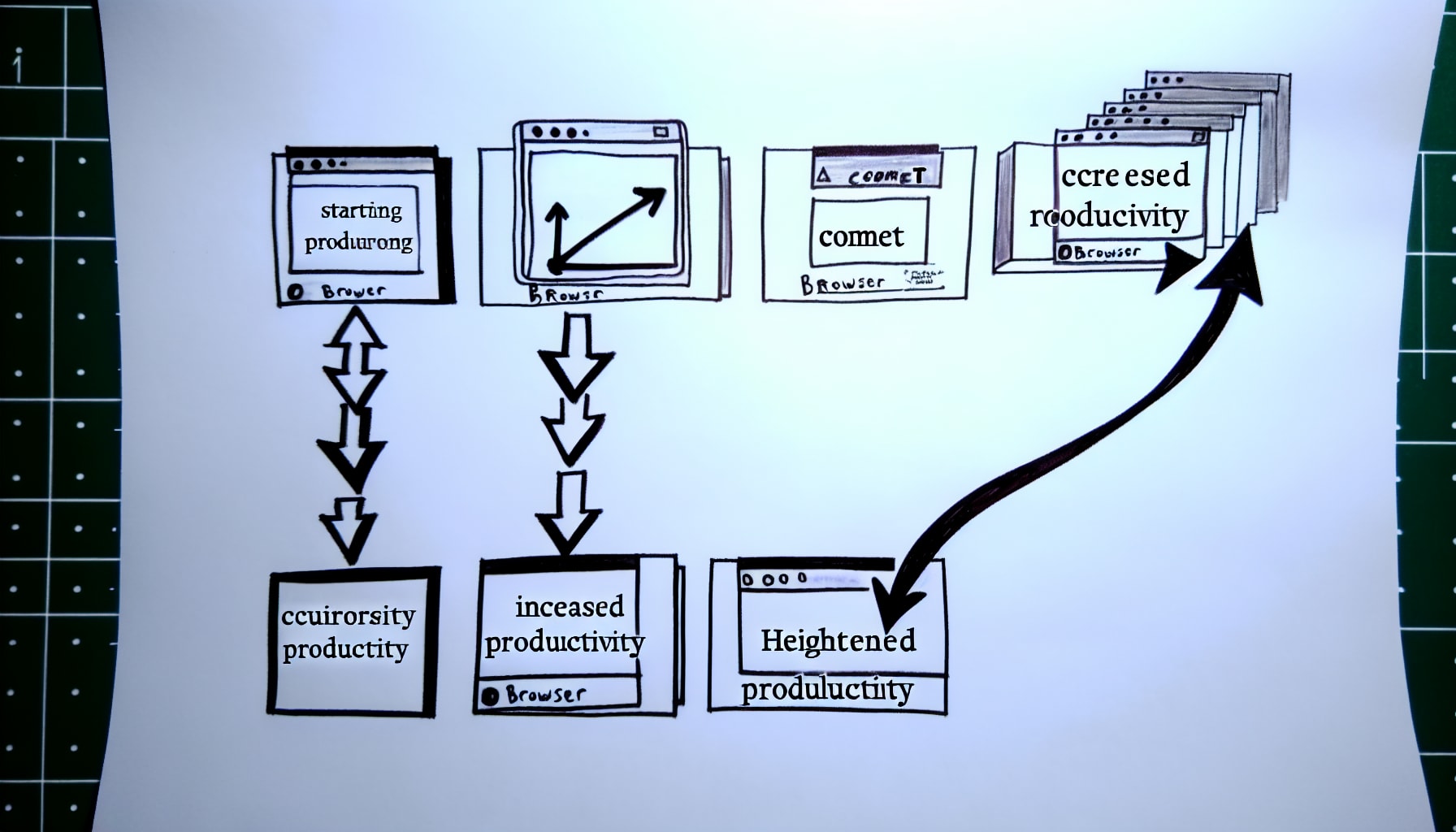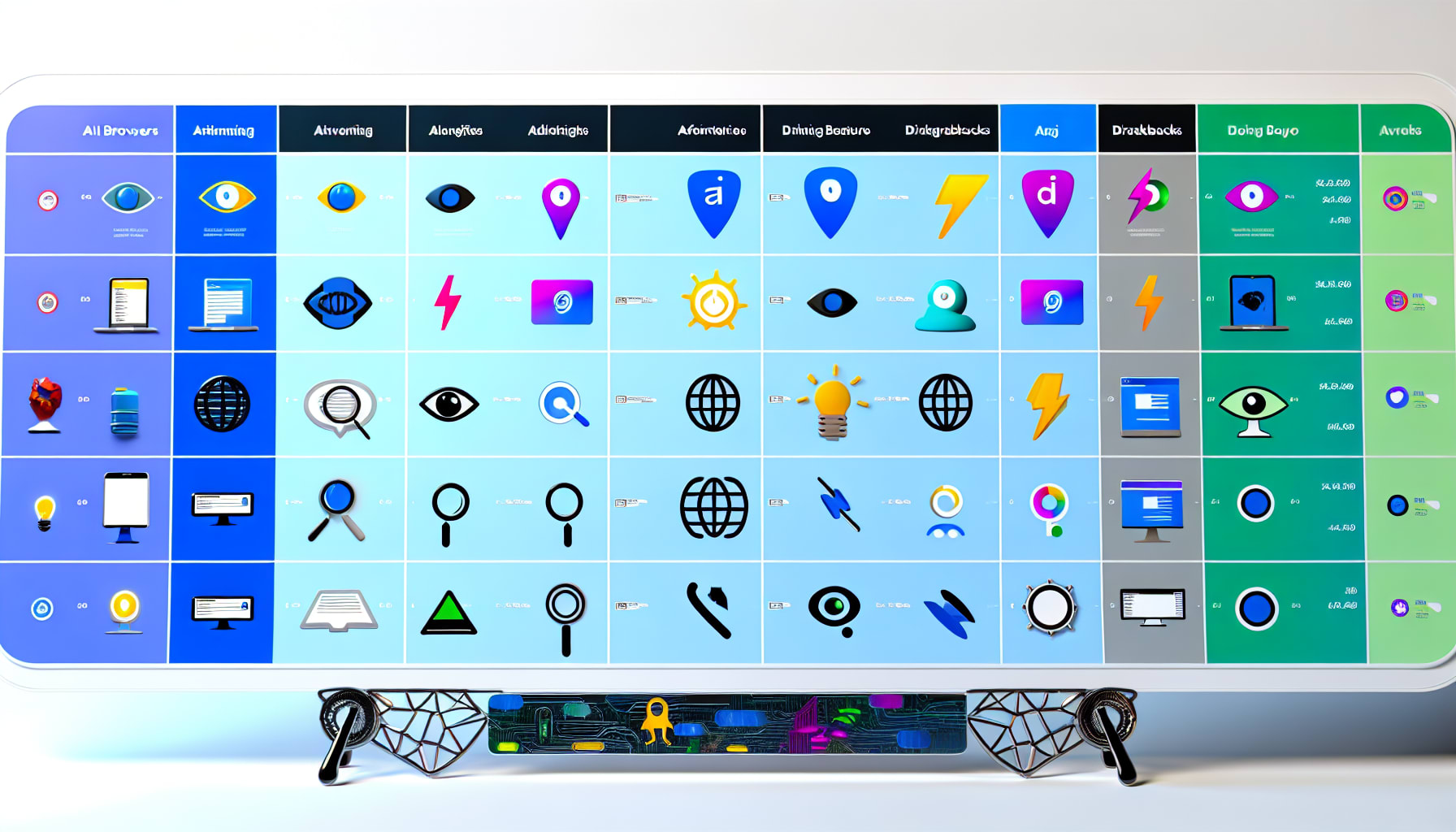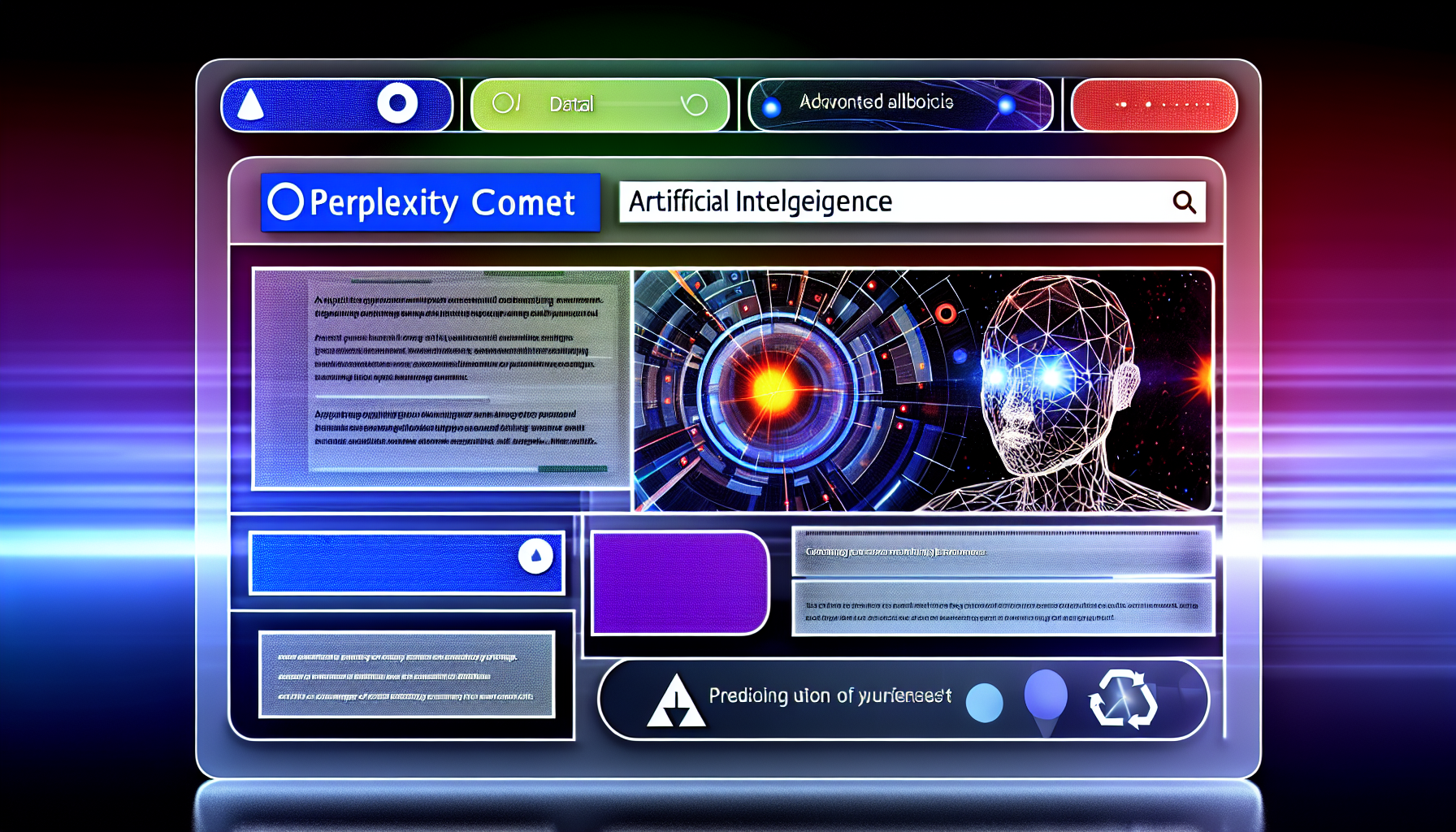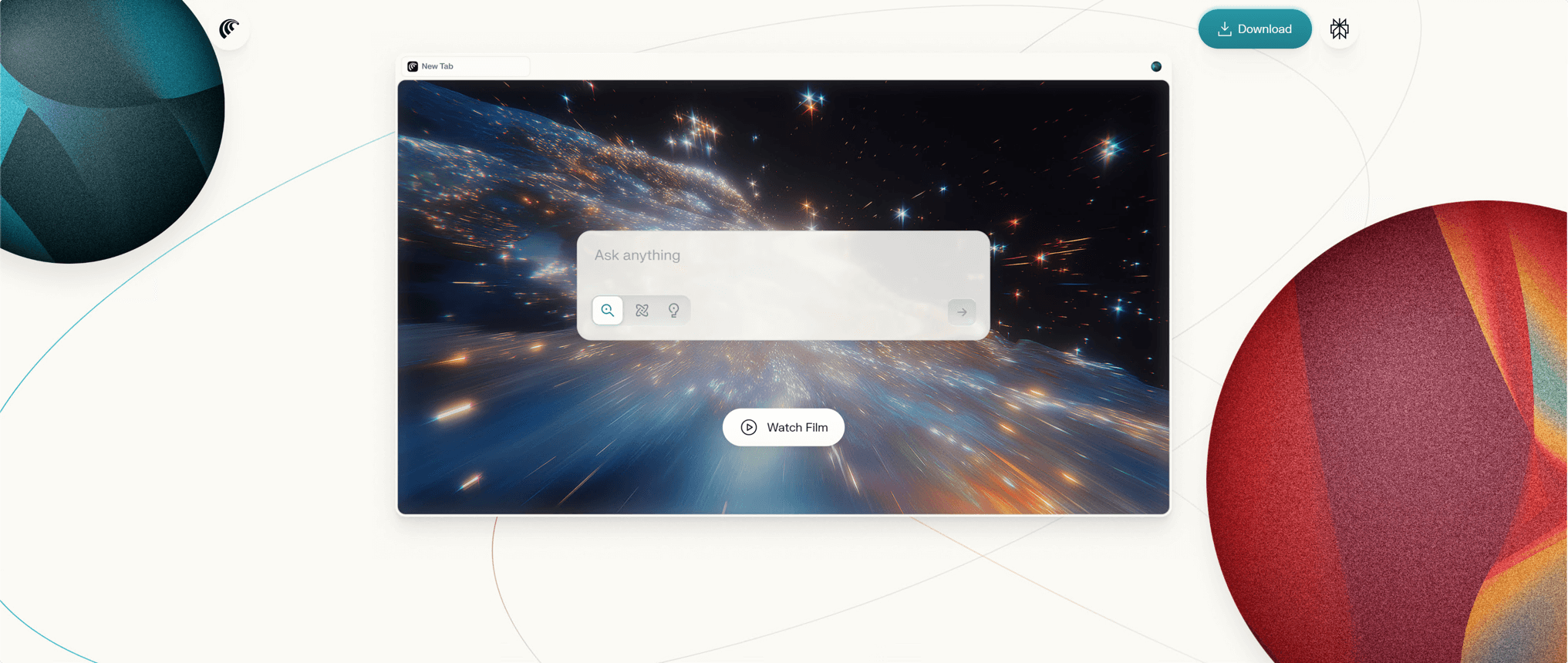For decades, we’ve been “browsing” the web through a passive window, clicking through endless tabs and struggling to connect disparate pieces of information. The internet is our greatest source of knowledge, yet the tools we use to access it were never designed to actively help us think or learn. This creates a constant state of information overload, where our curiosity is often stifled by the sheer effort of organization. Perplexity is addressing this gap with its new browser, Comet. It’s not just another interface for viewing websites; it’s an intelligent partner designed to understand context, automate tedious tasks, and work alongside you. This article will explore Comet’s core capabilities, examine how it aims to enhance productivity, and discuss its potential role in office automation, as well as the significant market challenges it faces.
Let’s explore what sets this new browser apart from the rest.
Core Features and Intelligent Experience of Perplexity Comet
Perplexity Comet isn’t just a standard browser with an AI chatbot added on. Instead, AI is woven into its very fabric, creating a fundamentally different way to interact with the web. It’s built on Chromium, so switching from Chrome is seamless, but the user experience is designed from the ground up to be proactive rather than reactive.
Comet transforms browsing by integrating a proactive AI assistant that understands context, adapts to user projects, and analyzes content across languages.

AI-Powered Real-Time Webpage Comprehension
One of Comet’s most practical features is its “sidecar” assistant. This AI panel can be opened on any webpage and immediately has the context of what you’re looking at. You can ask it to summarize a lengthy article, explain a complex technical term, or even describe the content of an image on the page without copying and pasting anything. For instance, you can open a YouTube video and ask the assistant to provide a synopsis, saving you time before you commit to watching. This constant, context-aware presence turns every page into an interactive learning opportunity.
Personalized Assistant and Project Adaptation
Comet aims to be a “thought partner” that learns how you work. It moves beyond simple browsing sessions by allowing you to organize your work into projects or “spaces.” As you research a topic, Comet adapts in real time, helping you connect ideas and keep your digital life organized. It can automatically group your open tabs by topic, reducing the visual clutter that plagues most users. The more you use it, the better it understands your thought patterns, becoming a personalized tool that anticipates your needs.
Perplexity describes its vision clearly: “With Comet, the web becomes a tool of curiosity, helping you connect ideas, move faster, and turn wonder into momentum.”
Rapid Multi-Language Content Analysis
For researchers, students, and global professionals, the internet’s language barriers can be a significant obstacle. Comet includes the ability to quickly comprehend and summarize any webpage, regardless of the language it’s written in. This feature provides a “direct line to the world’s knowledge,” as the company puts it, making information from international sources more accessible than ever before. This aligns with a broader trend of using AI to bridge communication gaps and democratize access to information.
How Comet Browser Enhances User Curiosity and Productivity
Beyond its specific features, Comet is designed to change the user’s fundamental relationship with the web. By handling the mundane tasks of searching and organizing, it frees up your mental energy to focus on what truly matters: thinking, creating, and exploring.
By automating tedious tasks and proactively connecting information, Comet frees up mental space for users to explore ideas and work more efficiently.

Curiosity-Driven Browsing Design
Traditional search engines give you a list of links to sift through. Comet, by contrast, provides direct, cited answers through its integrated “answer engine.” This subtle shift encourages a more inquisitive approach. Instead of just searching for what you know, you’re more likely to ask follow-up questions and explore tangential ideas presented by the AI. Perplexity believes this model can “nurture curiosity,” turning passive browsing into an active dialogue with information.
Efficient Information Connection and Organization
The frustration of having too many tabs open is universal. Comet tackles this head-on with its automated tab grouping. As tested by reviewers at Mashable, the browser can intelligently organize open tabs by theme, creating a much cleaner workspace. Furthermore, the AI can scan the content across all your open tabs to perform tasks like comparing products or finding a specific piece of information you saw earlier, saving you from the manual effort of clicking back and forth.
Automated Tasks and Workflow Support
This is where Comet’s agentic capabilities truly shine. By giving the AI permission to “take control of your browser,” you can delegate simple but time-consuming tasks. Reviewers have successfully used it to unsubscribe from promotional emails, close all tabs that haven’t been used in 15 minutes, or even post a draft to a social media account. While some of these tasks might be done just as quickly by hand, the ability to offload them allows for better focus on more complex work.
This push toward automation aligns with workplace trends. A recent Gallup poll found that nearly 40% of workers now use AI on the job, a figure that has almost doubled in two years, signaling a growing acceptance of AI as a productivity tool.
The Future of Comet Browser in White-Collar Office Automation
Perplexity’s ambition for Comet extends far beyond just improving personal browsing. The company envisions it as a foundational tool for the future of knowledge work, capable of automating entire roles within an organization.
Perplexity positions Comet not just as a browser, but as a future AI operating system capable of automating complex white-collar roles like recruiting and administrative support.

Automating Recruiter and Administrative Assistant Roles
Perplexity CEO Aravind Srinivas has been outspoken about Comet’s potential to automate key white-collar jobs. He argues that tasks traditionally handled by recruiters and administrative assistants are prime candidates for automation. For example, he claims that a week’s worth of a recruiter’s sourcing and outreach work could be accomplished with a single, well-crafted prompt. Similarly, daily administrative duties like email triage, calendar management, and meeting preparation could be handed off to the AI agent.
Deep Integration with Tools like Gmail and LinkedIn
This level of automation is made possible through deep integrations with essential workplace applications. By connecting to a user’s Gmail, Google Calendar, and LinkedIn accounts, Comet can perform multi-step workflows. It can generate lists of potential job candidates, find their contact information, send personalized outreach emails, track responses in a Google Sheet, and even schedule interviews by resolving calendar conflicts. This demonstrates a shift from single-task AI to a more holistic AI agent capable of complex reasoning.
The Future Outlook as an AI Operating System
Ultimately, Srinivas sees Comet evolving into an “AI operating system” for white-collar work. This system would run continuously in the background, executing commands and managing workflows based on natural language instructions. It’s a bold vision that reframes the browser from a simple gateway to the internet into the central command hub for a person’s entire digital work life.
In an interview with Business Insider, Srinivas laid out this vision: “A recruiter’s work worth one week is just one prompt: sourcing and reach outs… You want it to keep following up, keep a track of their responses.”
Market Positioning and Developmental Challenges for Perplexity Comet Browser
Despite its innovative approach, Comet’s path to widespread adoption is filled with significant obstacles. It enters a crowded market and must convince users to overcome major hurdles related to privacy, cost, and reliability.
Despite its innovative features, Comet faces stiff competition, significant user privacy hurdles, and the challenge of proving its value to justify a premium subscription.

Competition with Google Chrome and Other AI Browsers
Comet is not entering a vacuum. It faces formidable competition from established players like Google Chrome and Apple Safari, which command the vast majority of the market. Furthermore, the AI browser space is heating up, with rivals like The Browser Company’s Dia offering similar features and rumors of OpenAI developing its own browser. Google itself is integrating its Gemini AI deeply into Chrome, meaning Perplexity must offer a demonstrably better experience to persuade users to switch.
User Privacy and Data Security Considerations
Perhaps the biggest challenge is user trust. For Comet’s AI agent to perform its most powerful tasks, it requires an extensive and, for many, an uncomfortable level of access to personal data. This includes permission to view your screen, read and send emails, access your contacts, and manage your calendar. As one TechCrunch reviewer noted, granting these permissions can feel unsettling. Overcoming this privacy barrier will be critical for gaining mainstream acceptance.
Subscription Service and Future Free Version Plans
Currently, Comet is available to Perplexity Max subscribers, a premium tier costing $200 per month. This high price point limits its initial audience to a small group of power users and businesses. While a free version is planned for the future, the browser must first prove its reliability. Hands-on tests have shown that while it excels at simple tasks, it can struggle with more complex requests, sometimes “hallucinating” incorrect details like dates for a booking or failing to understand nuanced instructions for a food order.
Acknowledging these limitations, a Perplexity spokesperson told The Verge, “Some of the more complicated agentic actions like shopping do have a higher failure rate than simpler tasks, but this is actually a limitation of current AI models… So this will only get easier and better in Comet.”
Conclusion
Perplexity Comet is more than just a new browser; it’s a compelling glimpse into a future where our tools for accessing the internet are intelligent, proactive partners. By integrating AI at its core, it offers powerful features for comprehension, organization, and automation that have the potential to significantly boost productivity and reignite a sense of curiosity in how we explore the web. Its ambitious vision of becoming an “AI operating system” for knowledge work could reshape entire professions.
However, the road ahead is challenging. Comet must navigate a fiercely competitive market, address valid user concerns about privacy, and refine its technology to be consistently reliable. The central question is whether the undeniable convenience and power it offers will be enough for users to entrust an AI with the keys to their digital lives. For now, Comet stands as a bold experiment that pushes the boundaries of what a web browser can be.









